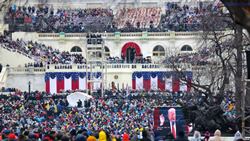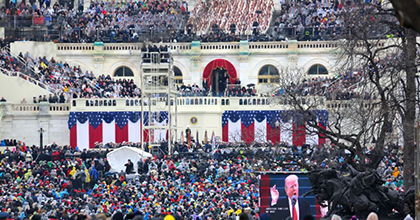The Trump administration, a symbol of a new 21st century division
It is said that the beginning of the Trump administration symbolizes the division in American society. That is true, but in fact, divisions in American society are nothing new. For example, in the 19th century, the wealthy who lived on the East Coast obtained information from top-class newspapers, but people who lived in the West were busy working every day and survived without subscriptions to large-city quality newspapers. These groups did not interact with each other and were truly divided, and when elections came around, each group voted for the candidate whom they could rely on. This changed at the beginning of the 1920s with the launch of radio broadcasts. Regardless of where people lived and their economic conditions, they were able to obtain the same information. Following World War II, TV broadcasts fully took off. There were not, however, as many channels as there are now. All Americans watched the same channels—that is, ABC, CBS, and NBC. Things remained this way until the end of the 20th century. In other words, the almost fifty years of the second half of the 20th century can be considered a rare period in American history when all Americans watched and listened to the same thing and obtained the same information. For those of us living during that time, it seemed only natural. However, it is relatively rare in history, and one can argue that since the beginning in the 21st century, we are witnessing the U.S. becoming divided again. This is mainly because of the rapid development of the Internet. A new type of division is developing in which people obtain only the information and opinions that they want to see and hear, while interacting with people who think like themselves. In this way, one may be able to argue that the Trump administration, which came to be because of an “Internet campaign” strategy, symbolizes this new division.
What makes this new division scarier than the one before the 20th century is not only that individuals are prejudiced toward information they are interested in, but it is irrelevant whether that information is true or not. For example, regarding the number of people who attended President Trump’s inauguration ceremony, even though the media provided data that showed fewer people attended his inauguration ceremony than President Obama’s, President Trump said that the media was lying, and his supporters believed him. In other words, people place importance on information that is advantageous for themselves whether it is true or not. This tendency results in an inward-looking society composed of people who think the same way and possess the same values, which creates a conservative society. This is not limited to the U.S.; the conservative nationalism appearing in various European countries has the same feel. After two world wars in the 20th century, the world should have become more permissive of diversity and started to promote globalization and cooperation. However, if more and more people place a greater value on doing as they want and desire than on their relationships with others, the world could dramatically change. In this sense, one may be able to argue that the inauguration of the Trump administration represents a possible major turning point in world history.
President Trump’s actions are pleasing his supporters

On the other hand, the Trump administration also symbolizes a division based on economic disparities between Americans. In Japan, the anti-Trump movement has been widely covered in the news, but this is because the Americans whom Japanese reporters meet and interact with live in cities, have a certain level of education, and are well off. For people living in Midwestern states who have lost their jobs because the factories they worked at closed, and who were forced to make do with low-paying jobs, concepts such as world historical trends and diversity are meaningless. People who work hard for a weekly paycheck and never know when they will lose their job are only annoyed and angered at glitzy Hollywood stars calling for anti-Trump protests. In fact, the second half of the 20th century was a period when Americans felt a sense of unity as a people that has seldom been seen in its history, and when America possessed its greatest relative wealth and power compared to Europe and Japan, which were exhausted by the world war. Present-day America, however, lacks that wealth. Even though their grandparents and parents lived rich lives, American workers are slowly sinking into poverty. This is what they really feel, and are the actual conditions they face. Under these conditions, more people wanted Trump to be president than wanted Clinton to be president.
President Trump is now working hard to keep his campaign pledges and satisfy his supporters. He has said various things such as Japan manipulates its currency and that he will withdraw the U.S. from the Trans-Pacific Partnership (TPP) and negotiate bilateral deals, but it is probably not necessary to seriously respond to each of these statements now. He may be speaking more to his supporters than making strategic statements. There is no basis for his statement about Japan manipulating its currency, and TPP is important in terms of a China strategy; therefore, he may revive negotiations but under a different name. It is probably important that Japan prepare now for such actual negotiations.
Can President Trump boldly redistribute wealth?
What is probably more important is the future response of Trump supporters. President Trump is pleasing his supporters with visible acts such as getting companies to bring manufacturing plants back to the U.S. and restricting immigration, but it will probably be impossible to truly improve the lives of workers unhappy in current conditions with these acts. This does not mean, however, that there is no way for President Trump to become a great president. In fact, there is a great example of this. Selected as vice president even though Republican Party leaders considered “that mad man” dangerous, Theodore Roosevelt became president following the assassination of President McKinley. Disregarding worried party leaders, he resolutely did what the people wanted, including constraining monopolies and signing the Pure Food and Drug Act. He is one of the four great presidents whose likenesses appear on Mount Rushmore. What is probably important for President Trump is to take bold action like Theodore Roosevelt who adopted policies that truly met the desires of the people. It is true, present-day America is not the great country with wealth and power that vastly surpasses that of other countries like it did following World War II. It is still, however, an economic superpower. The problem is excessive plundering by some of the wealthy. It is probably more important to redistribute wealth to correct these disparities than to make America great again. For example, if President Trump were to implement bold policies such as reforming Wall Street and redistribute the wealth from the rich to the poor, he may go down in history as a great president.
If people who voted for President Trump remain poor, instability in the U.S. will grow, and they may choose solutions that only benefit themselves. Such action may also be seen in U.S. diplomacy. In this sense, we cannot take our eyes off how Trump supporters react. Whether an inward-looking conservatism in the U.S. alters the trajectory of world history now in the 21st century, as it did in reaction to world wars in the late 20th century, depends on the populist President Trump. Therefore, one has to keep an eye on the reaction of his supporters.
* The information contained herein is current as of April 2017.
* The contents of articles on M’s Opinion are based on the personal ideas and opinions of the author and do not indicate the official opinion of Meiji University.
Information noted in the articles and videos, such as positions and affiliations, are current at the time of production.

